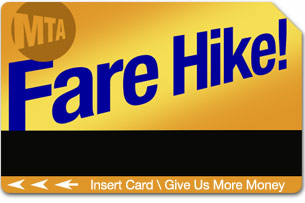 The Metropolitan Transportation Authority is facing a crisis of credibility. In just a few days, subway and bus riders will be hit with the largest fare hike in history. Earlier this year, when talk of a fare hike was growing, I urged the MTA to delay consideration of an increase and open its books – so all New Yorkers could know if such an increase was necessary.
The Metropolitan Transportation Authority is facing a crisis of credibility. In just a few days, subway and bus riders will be hit with the largest fare hike in history. Earlier this year, when talk of a fare hike was growing, I urged the MTA to delay consideration of an increase and open its books – so all New Yorkers could know if such an increase was necessary.
Had the MTA heeded my call, their integrity would not be in question.
After three months of analyzing the New York City Transit Authority’s finances, I have concluded that the MTA has broken its public trust and misled New Yorkers with unclear and inaccurate reporting of its financial position.
The issue is clear: Straphangers should not be asked to accept a fare hike without accurate evidence detailing its necessity. That is currently not the case. We have found that the books used by the MTA’s Board to determine the need for an increase were incomplete, misleading and obfuscating. There is simply no way these books could have provided the board with the basis for sound policy making.
My audit made five key findings:
• Specifically, it found an undisclosed $300 million account that was characterized as an “investment pool.” What this money was for, how it was spent and when it was spent remains a mystery, because the MTA refused to disclose this information.
• Furthermore, the Transit Authority’s numbers just did not add up. For example, in 2001 and 2002 financial reports, the Transit Authority overstated its operating expenses by more than $850 million. This kind of accounting error gave the impression that the authority’s operating deficit was actually larger than it was – and exaggerated the need for a fare hike.
• The Transit Authority’s 2003 operating budget proposal was woefully incomplete. It lacked basic, critical information, such as the costs associated with the recent collective bargaining agreement and the additional revenues that transit officials believed a fare hike would produce. Conveniently, the board voted to approve a revised budget that included this information three weeks after approving the fare increase. The agency even tripped over its own numbers. The proposal contained conflicting deficits – on one page it put the deficit at $1.632 billion and, on another, $2.009 billion. The public, elected officials, and the MTA Board put their faith in a document that told two different stories.
• The Transit Authority overestimated the drop in ridership due to the fare increase, contrary to its own historical data. This served to deflate future revenues and further justified their call for a 33 percent fare hike.
• My audit confirmed that New York City subway riders get shortchanged by paying a larger share of their system’s budget compared to their suburban counterparts, who ride the MTA’s commuter lines.
The MTA Board should re-examine the need for an increase, this time using clear and accurate financial information. At least then, all New Yorkers could be confident that a hike of this magnitude, while painful, may also be necessary.
Yet there is a larger issue at stake. We need to change the culture that leads transit officials to believe that the system belongs to them – and that they are accountable to no one.
The city’s transportation system belongs to the people. The people have a right to understand its finances and make judgements about its policies. It is the responsibility of the MTA to ensure that it answers not only to its board but also to the public and their elected officials.
William C. Thompson, Jr. is the Comptroller of the City of New York
RELATED ARTICLES:
The Fare Hike Mess by Bruce Schaller
The MTA’s On The Wrong Track by Councilmember John Liu, chair of the transportation committee.




